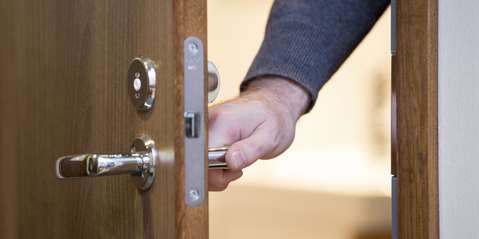Your Cart is Empty
Categories
Industry
What is a Door Strike and Do You Need a Special One for Going Keyless?

A door strike is one of the primary components of a typical door locking system. Most regular doors have three major parts that work together to keep the door secure. The first two parts are the handle and the latch, both of which combined (along with several other smaller components) are commonly called the lockset. The handle is pretty self-explanatory; it’s the device that you grab and turn to open the door. The latch is the small metal bolt that you will see sticking out of the side of the door when the door is open. Latches are typically spring-loaded, and they lock into place when the door is fully closed, keeping the door secure.
The third part is the door strike (also called the “strike plate”), which essentially looks like a metal plate with a hole (or holes) cut out of it. The door strike is fastened, usually by screws, onto the frame of a doorway, and it is carefully aligned with the lockset in order to give the latch a place to sink into when the door closes.
Door strikes are designed to conform to the shape of the latch, as well as the thickness of the door frame. They help to protect the doorjamb from the friction that is created by the latchbolt during normal use, and they also provide additional reinforcement for doorjambs that are made of softer materials such as wood. For doors in heavily trafficked areas, it’s a good idea to perform regular maintenance by keeping the screws on the strike plate tightened, so that it will stay in proper alignment with the lockset. If the strike plate becomes loose, it can cause several problems including making doors more difficult to open and close, or causing damage to the door and/or doorjamb.
Do You Need Special Door Strikes for Going Keyless?
The answer depends upon which type of keyless device you’re going to install. The majority of mechanical and electronic keyless locks available do not require any kind of special door strike, but there is a certain type of strike plate known as an “electric strike” that is unique in its function and application.
Electric strikes are commonly used in commercial access control systems, because they allow doors to remain locked on the exterior side in order to prevent public access. The main difference between electric strike plates and regular strike plates is that with an electric strike, the locking function is partially controlled by special mechanisms within the strike plate itself. Any time the release system is activated, a hinged piece of metal found inside the electric strike will pivot out of the way in order to allow the door to be opened without having to turn the door handle. A common example of this is a door that remains locked until someone “buzzes you in.” Electric strikes are often used for doors that are utilized in heavily trafficked areas.
Fail Safe vs. Fail Secure
Electric strikes typically come in two configurations: Fail-safe and fail-secure. The fail-safe (a.k.a. fail-open) configuration will cause the door to lock when an electric current is applied to the strike via a remote command. In this respect, the fail-safe strike operates somewhat similar to a magnetic lock. If there’s a power failure, a fail-safe strike will not operate, but the door can be pushed or pulled open if necessary.
With the fail-secure (a.k.a. fail-locked) configuration, applying an electric current will cause the door to unlock. Should a power outage occur, you can still utilize the mechanical lock on the secure side of the device to open the door. Fail-secure strikes are the ones that are commonly used for remotely buzzing in guests or customers. Electric strikes such as the World Strike 77V57 can be set to operate as either fail-safe or fail-secure, offering you premium flexibility. In addition, the 77V57 requires no special cutting or drilling into your door frame in order to install the device.
So should you choose an electric strike plate for your access control system? The answer will depend upon the purpose or function that the door serves, as well as your desired level of security. Electric strikes are commonly recommended for commercial and industrial applications, because they can withstand the frequent traffic that is typical of areas that require access control systems. So if you’re looking to beef up the security in the most important area(s) of your business, an electric door strike would be an excellent choice.
World Strike 77V57 with Mounting Kit, Latch Bolt Monitor & Pre-load
Browse by Category
© 2025 GoKeyless. All rights reserved. Privacy Policy. Terms of Use. Powered by Brandography.



 Over 5 Million Locks Sold
Over 5 Million Locks Sold Trusted Since 2003
Trusted Since 2003 Help
Help
